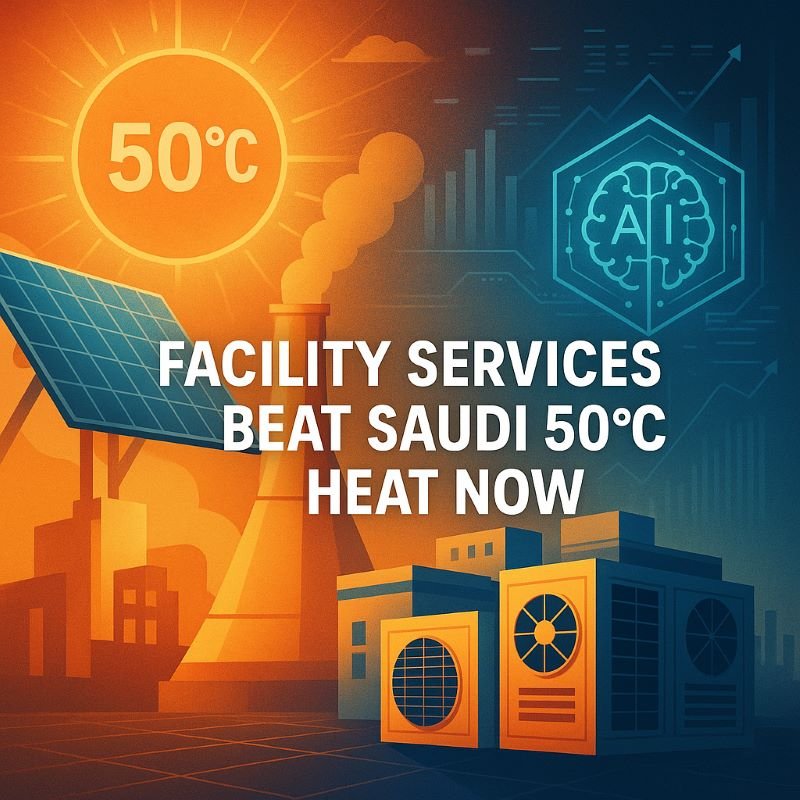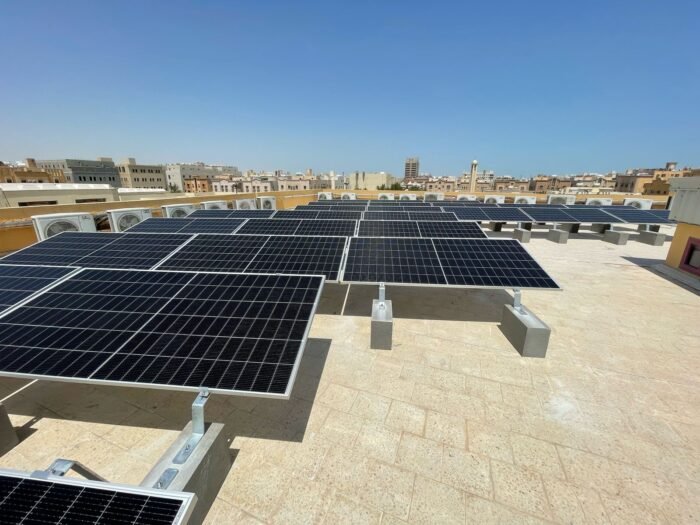The facility management companies in Saudi Arabia (FM) sector is passing through a revolutionary stage. As the Vision 2030 increases urbanization, giga-projects transforming the cities and business outsourcing operational activities, FM services have become a decisive facilitator of the national development.
Introduction to Saudi Arabia Facility Management.
Facility Management in Saudi Arabia, What and Why It Matters.
Facility management encompasses the care, safety, and productivity of buildings and infrastructure, including cleaning and security as well as its energy and technical maintenance. FM helps in ensuring the new urban developments, commercial towers and mega- projects run smoothly in Saudi Arabia contributing towards productivity and sustainability.
The Future of Saudi FM Industry in 2025.
As stated in the report by Fortune Business Insights (2025), the Saudi Arabian facility management market had been valued at USD 25.75 b Billion in the year 2024 and is expected to grow to USD 56.33 b Billion in 2032 with a CAGR of 10.8. Soft services (cleaning, landscaping, and catering) make almost the majority of revenue (74 0.003), and hard services (HVAC, electrical, structural maintenance) take the other portion.
Major Growth Drivers which have influenced the Market.
Giga- Projects Fueling FM Demand Vision 2030.
The largest generator of FM demand is the blueprint of the Saudi Arabia Vision 2030. Government has invested more than SR 4.9 (or around USD 1.3) trillion in infrastructural and tourist development. Mega-developments like NEOM, The Line and Red Sea Global need complex FM approaches in their sustainability, safety and long-term operation. Hospitality growth alone, of an additional 362,000 hotel rooms by 2030, introduces titanic requirements in cleaning and maintenance and energy-management solutions.
City and Urbanization and Smart City Projects.
By the year 2030, the urban population of Saudi Arabia is expected to reach more than 84 percent. Riyadh and Jeddah are already implementing smart-city initiatives that are pushing towards the use of IoT-enabled buildings based on the use of data-driven FM to control energy, lights, and occupants in the most cost-effective ways.
Movement towards Outsourced and Integrated Facility Management.
FM market is undergoing a fast transformation between in-house management and outsourcing to a professional one. According to Mordor Intelligence (2024), outsourced FM services contribute 65.74% to the overall market revenue, and integrated facility management (IFM) solution is the quickest growing. IFM is favored by organizations as a means of cost savings, scalability and integrated service accountability.
Performance and Market Segmentation.
By Type of Service Used Hard vs Soft Facility Management.
Soft FM (74% market share): cleaning, pest management, landscaping, catering, waste management, and security.
Hard FM (26%): HVAC systems, mechanical and electrical, and plumbing maintenance, and structural maintenance. The overpowering of soft services is as a result of the explosion in hospitality, retail and commercial real-estate building.
By End‑User Industry
Business- Corporate offices, shopping centers, mixed use buildings.
Industrial – oil and gas, logistics, manufacturing; forecast CAGR 14 0 (20252032)
Healthcare – hospitals, clinics, laboratories in need of FM, which is hygienically essential.
Hospitality & Tourism – hotels, resorts, entertainment hubs as a product of the Vision 2030.
Government and Education- intelligent campuses, and maintenance of public infrastructure.
By Ownership Model
More of the Saudi companies are outsourcing to specialized FM providers. The efficient use and a sense of compliance are now done by large real-estate operators that integrate hard, soft and administrative services with one contract- better results.
Sustainability Trends Technology.
IoT, AI, and BIM Smart Facility Management.
The Kingdom is undergoing digital transformation that is redefining FM. Large infrastructure projects like NEOM and The Line can have predictive maintenance, real-time energy monitoring, and digital twins with sensors, Building Information Modeling (BIM), and AI-based analytics. Such technologies reduce the costs of operation by up to 20-30 percent and increase the life of equipment.
Green Building Push and Sustainability.
Green building standards are fast gaining popularity in Saudi Arabia. By 2024, over a thousand LEED-certified projects are registered in the Kingdom (Astute Analytica, 2024). FM providers are incorporating energy saving HVAC and lighting systems, water recycling and waste sorting, and client-oriented reporting that is ESG-friendly. Sustainable FM practice is not only required to be regulatory-compliant, but also commercially beneficial, which appeals to international investors.
Opportunities and challenges.
Lack of skills and localization of the workforce.
The industry is experiencing the lack of certified specialists in the field of technicians and smart-FM. The localization policies of Vison 2030 also promote training of Saudi nationals as FMs, which will provide a chance to engage in vocational courses and upskilling.
Growing Competition and Consolidation.
The outsourced FM has more than 100 companies which have resulted in market consolidation. Local companies are partnering with international FM leaders, which are integrating local expertise with international benchmarks.
SME opportunities in the Niche FM Services.
Small FM companies can focus on residential buildings, small-scale hospitality developments, or medium-scale commercial buildings. Niché specialization like energy auditing or green -building maintenance gives differentiation in an extremely competitive market.
Future Outlook (2025‑2032)
Anticipated Market Size and CAGR
The Saudi FM market projections show that the market will grow over 1.5 times to USD 56.33billion by 2032 with a consistent CAGR of 10.8%. Constant development of real-estates, digitalization, and ESG compliance will ensure further growth.
New Growth Avenues- Intelligent Infrastructure and ESG-Driven FM.
Following the development of Saudi Arabia in the direction of a carbon-neutral and smart-city, FM providers with a specialization in digital building management systems, the integration of renewable energy, and the analytics of the ESG report will receive valuable contracts in both governmental and non-governmental spheres.
Conclusion
Saudi Arabia is evolving the facility management sector to strategic, technology-driven operations in line with the Vision 2030. Large infrastructure expenditure, high demand, and the fear of sustainability mean that the FM providers who are able to offer integrated and smart solutions are in the best position to succeed.
Want to optimize your Saudi Arabian facilities? Discover our Facility Management Solutions in KSA to learn the way in which data-driven FM can enhance efficiency, compliance, and sustainability.



